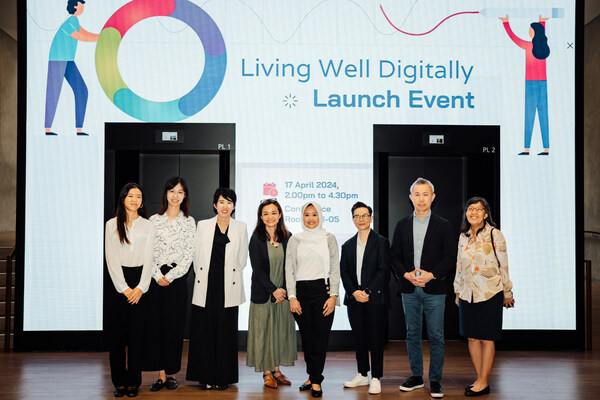SINGAPORE, April 19, 2024 /PRNewswire/ -- On the 17th of April 2024, the Centre for Trusted Internet and Community (CTIC) at the National University of Singapore (NUS) launched a groundbreaking new initiative, "Living Well Digitally" (https://ctic.nus.edu.sg/living-well-digitally/). Developed in partnership with the DQ Institute and in support of the Infocomm Media Development Authority (IMDA)'s Digital for Life movement, the initiative aims to educate, engage, and empower individuals around the world with the knowledge and tools to navigate the complexities of the digital world, fostering a more balanced and informed digital lifestyle.

The "Living Well Digitally" initiative introduces three key components:
Developed by a team of researchers from NUS-CTIC (led by Professor Audrey Yue, Professor Natalie Pang, Professor Zhang Renwen, in collaboration with Professor Lim Ee-Peng from the Singapore Management University, as well as Dr. Yuhyun Park from DQ Institute), the DWIF was crafted over two years of research, refinement, and validation. This included consultations with 23 experts (policymakers, social service agencies, and academics) from Singapore, China, the US, and the UK, followed by pilot tests with over 1,300 combined in Singapore and worldwide. This was followed by a cross-country population survey with over 4,000 individuals across four cities in Singapore, Seoul, Shanghai and London.
To celebrate the public launch of the "Living Well Digitally" initiative, CTIC organized an official launch event at NUS for stakeholders from governmental ministries and organizations including the Ministry of Communications and Information and IMDA, social service agencies such as TOUCH Community Services, and leading tech companies like Meta and ByteDance (TikTok).
"In today's digital landscape, prioritizing digital wellbeing is essential. With the Living Well Digitally initiative, we're sparking a movement to educate and empower individuals in Singapore and worldwide to take ownership of their digital experiences and cultivate meaningful connections both online and offline," said Professor Audrey Yue, Principal Investigator of the project, Deputy Director of CTIC, Head of Department and Professor of Communications and New Media at NUS. "By introducing the Digital Wellbeing Indicator Framework and Living Well Digitally platform, we hope to provide individuals, social workers, educators, tech corporations and policymakers with an instrument that can help everyone and anyone to 'live well digitally' in the digital age."
In her keynote address, Guest of Honour Mdm Rahayu Mahzam, Senior Parliamentary Secretary for the Ministry of Health & Ministry of Law, emphasized the importance of digital wellness and mindful use of technologies for people of all backgrounds, saying, "Whether you identify as a parent, an educator, or a tech practitioner, it is crucial that we think about our approach and relationship with technologies in a mindful way."
Mdm Rahahyu Mahzam added, "We hope that this toolkit will add the range of resources under the Digital for Life movement to educate, engage and empower Singaporeans to strengthen their digital wellbeing and resilience."
During the event, the research team unveiled the "Living Well Digitally" website and showcased the Powered by DQ Digital Wellbeing Assessment tool. "Powered by DQ" is a seal of trust that a digital literacy intervention is credible and impactful based on the IEEE DQ Global Standards (IEEE 3527.1TM), providing the NUS-CTIC framework with alignment and impact measure tools to identify areas of strength and weaknesses for actionable insights and further initiative development.
Dr. Yuhyun Park, founder of the DQ Institute, said, "DQ Institute is honoured to collaborate on this meaningful global initiative aimed at understanding and enhancing digital wellbeing in an era of unprecedented developments in artificial intelligence (AI). While the effects of AI on individual wellbeing continues to unfold, the commitment of the NUS-CTIC research team is poised to unveil actionable insights and drive positive change. This impactful initiative will empower communities with the essential tools and knowledge needed to navigate the risks and opportunities presented by AI, ensuring a more balanced approach to digital wellbeing."
About NUS-CTIC:
The National University of Singapore Centre for Trusted Internet and Community (NUS-CTIC) is dedicated to the inter-disciplinary study of the Internet and its implications on the society of the future. It aims to integrate social and behavioural science research, digital technologies, data-driven approaches, and policy studies to holistically examine the Internet and its societal impact. For more information, visit CTIC's Website: https://ctic.nus.edu.sg/
For Media Inquiries, Please Contact:
Ms. Wendy Poh Wan Li
wendy.p@nus.edu.sg
About DQ Institute:
The DQ Institute (DQI) is an international think-tank dedicated to setting global standards for digital intelligence and ensuring the safety, empowerment, and well-being of individuals, organizations, and nations in the digital age. DQ framework is recognized as the global standard for digital literacy, skills, and readiness (IEEE 3527.1-2020). DQI operates as a 501(c)(3) organization in the United States and as a not-for-profit organization in Singapore. For more information, visit DQ Institute's Website: https://dqinstitute.org
For Media Inquiries, Please Contact:
Ms. Eris Seah
eris@dqinstitute.org
Phone: +65 9396 9200
Infographic - https://mma.prnasia.com/media2/2391339/DQ_Institute_2.jpg?p=medium600